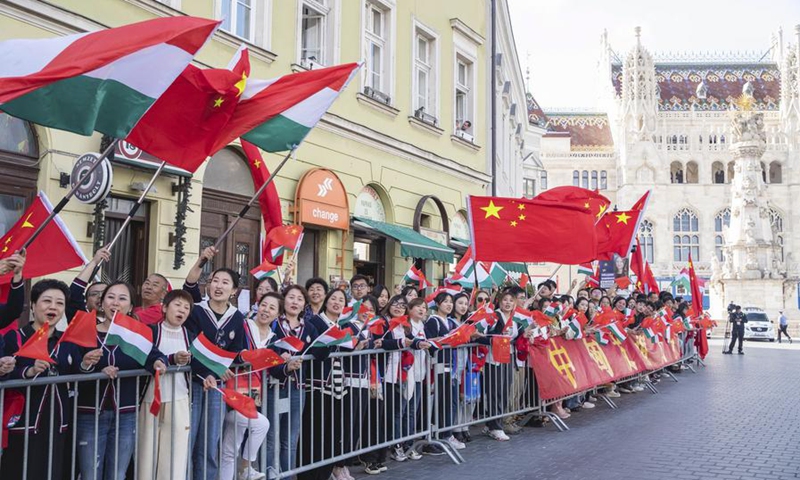Chinese President Xi Jinping returned to Beijing on Saturday morning after wrapping up state visits to France, Serbia and Hungary. Wang Yi, a member of the Political Bureau of the CPC Central Committee and foreign minister, referred to Xi’s Europe trip as a journey to carry forward friendship, enhance mutual trust, boost confidence and chart the course for the future during a press briefing.
Over the course of five days and six nights, the president visited three countries and four regions, participating in more than 30 events that seamlessly coupled bilateral and multilateral engagements, covering political, economic, and cultural activities. The trip includes formal state events as well as informal interactions, Wang said.
He noted that during Xi’s state visit to France, the Chinese president proposed to uphold independence and jointly prevent a new Cold War or bloc confrontation; adhere to mutual understanding and jointly promote harmonious coexistence ; commit to proceeding from a long-term perspective to jointly push for an equal and orderly multipolar world; and uphold mutual benefit while jointly opposing “de-coupling.”
The heads of state of China and France reached a number of areas of consensuses on further developing bilateral relations, agreeing to consolidate the strategic stability of bilateral ties, tapping into the broad potential of mutually beneficial cooperation, accelerate people-to-people exchanges, and build greater consensus on global cooperation, Wang added.
The two sides issued four joint statements on the situation in the Middle East, artificial intelligence and global governance, biodiversity and oceans, and agricultural exchanges and cooperation, as well as signed nearly 20 cooperation agreements.
During the visit to Serbia, President Xi and Serbian President Aleksandar Vucic agreed to form a China-Serbia community with a shared future in the new era, and Xi also announced China’s initial practical measures to support the building of the community.
Noting the decision marks a breakthrough in the building of a community with a shared future in Europe, Wang said it will surely become a new milestone in the history of China-Serbia relations and help the two countries speed up their respective modernization process.
During the visit to Hungary, Xi expressed willingness to take the opportunity to establish a China-Hungary all-weather comprehensive strategic partnership for the new era to inject new and strong impetus into bilateral cooperation, and Hungary is welcomed to be China’s companion on its path to Chinese modernization.
China is willing to work with Hungary to take Xi’s visit as an opportunity to write new story of China-Hungary all-weather comprehensive strategic partnership for the new era, and open a new chapter of mutually beneficial cooperation in a Golden Voyage.
In a trilateral meeting in Paris with French President Emmanuel Macron and European Commission President Ursula von der Leyen, Xi said there is neither geopolitical conflict nor fundamental conflict of interests between China and the EU.
Xi pointed out that this relationship does not target any third party, nor should it be dependent on or dictated by any third party, and that China and the EU should continue to see each other as partners, and remain committed to dialogue and cooperation.
In response to the so-called “China’s overcapacity” narrative, Xi noted that China’s new energy enterprises have not only enriched global supply and alleviated the pressure of global inflation, but also contributed significantly to global climate response and green transition.
Xi stressed that whether viewed from the perspective of comparative advantage or global market demand, there is no such thing as “overcapacity.”
On the Ukraine crisis, Xi clarified that China did not create the Ukraine crisis, nor is it a party to it, but rather, China has been working vigorously to facilitate talks for peace since the conflict first broke out.
China has the sincerity, positive actions and principled position, and China does not accept any remarks or actions that use the crisis to discredit China and incite a new Cold War.
During Xi’s visit to France, China and France agreed to treat the Paris Olympic Games as an opportunity to advocate for a global ceasefire and cessation of hostilities during the Games, to speak out for the peaceful settlement of hotspot issues, and to contribute to the construction of a world of lasting peace and universal security.
On the Palestinian-Israeli conflict, Xi said China supports the convening of a more broad-based, more authoritative and more effective international peace conference as soon as possible to promote the comprehensive, just and lasting settlement of the Palestinian question at an early date.
This visit further solidified the positive aspects of the China-EU relations, Cui Hongjian, a professor with the Academy of Regional and Global Governance with Beijing Foreign Studies University, told the Global Times on Saturday.
Cui noted the depth of exchanges between Chinese leaders and leaders of European countries is beyond expectations, for example, they touched on tricky issues related to overcapacity, adding that a China-France joint statement was released on the situation in the Middle East.
Strategic balance and stability between China and Europe would strengthen the fundamental stability of the global landscape, Cui said.

